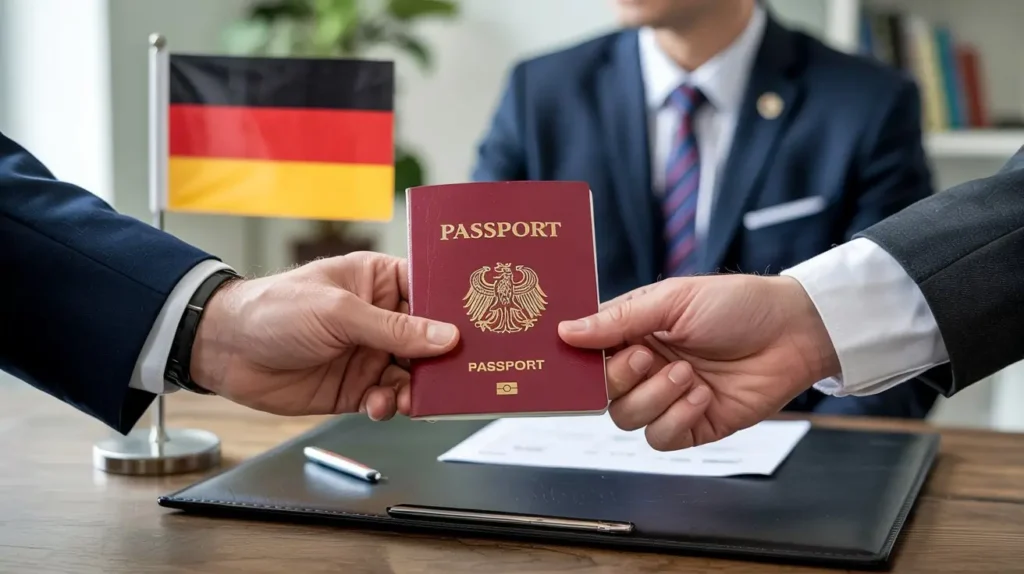Many worry about losing German citizenship when relocating outside Germany. Moving abroad opens new opportunities for many Germans. The experience brings adventure and growth. But what happens to your German citizenship?
German nationality law has evolved significantly. The 2024 citizenship reform brought substantial changes. This article explores when relocating might affect your German passport status.
German Nationality Through Emigration
German citizenship remains highly valued globally. It offers visa-free travel to numerous countries. It provides access to the EU job market. It guarantees certain rights and protections.
But can you lose this valuable status simply by moving away? The answer depends on several factors. The German government has specific rules about citizenship retention.
The 2024 German Citizenship Act made significant modifications. It clarified conditions for losing German citizenship when living abroad. Let’s examine these circumstances in detail.
Key Scenarios That May Affect Your German Passport Status
Several situations might impact your citizenship status. Understanding these scenarios helps protect your German nationality.
Acquiring Foreign Citizenship Voluntarily
Obtaining citizenship in another country can affect your German status. Traditionally, Germany discouraged dual citizenship. The law required Germans to choose between nationalities.
The 2024 reforms changed this approach significantly. Under the new law, Germans may acquire additional citizenships without automatically losing German citizenship. This represents a major shift in German nationality policy.
Previously, Germans needed special permission to maintain dual citizenship. Now, maintaining multiple nationalities has become easier. This benefits Germans working or settling abroad permanently.
Military Service in Foreign Armed Forces
Joining another country’s military historically risked German citizenship. The law viewed this as demonstrating allegiance to another nation.
The current provisions make distinctions based on circumstances:
| Military Service Type | Risk of Losing Citizenship | Notes |
|---|---|---|
| NATO country forces | Low risk | Generally permitted |
| EU member state forces | Low risk | Generally permitted |
| Non-NATO/EU forces with permission | Low risk | Prior permission required |
| Non-NATO/EU forces without permission | High risk | May lead to citizenship loss |
Germans considering military careers abroad should seek legal advice. Consulting the German embassy before making commitments helps preserve citizenship status.
Long-Term Residence Abroad Without Registration
Living outside Germany for extended periods requires certain actions. Germans must maintain connections to their homeland. This prevents administrative citizenship loss.
The German government tracks citizens through registration systems. The Bundesbürgerregister maintains records of German nationals. Keeping these records updated protects your status.
Germans living abroad should:
- Register with the local German consulate
- Renew German passports before expiration
- Maintain some connection to Germany
- Vote in German elections when possible
These actions demonstrate continued ties to Germany. They signify your intention to remain German despite living elsewhere.
The 2024 German Citizenship Law: Key Changes
The 2024 reform brought several important modifications to citizenship rules. Understanding these changes helps expatriates protect their status.
Dual Citizenship Liberalization
The most significant change affects dual nationality policies. Germany now fully accepts multiple citizenships. Germans no longer automatically lose citizenship when naturalizing elsewhere.
This represents a complete reversal of previous policies. For decades, Germany restricted dual citizenship. The new approach acknowledges global mobility realities.
Germans living abroad benefit tremendously from this change. They can integrate fully in their new countries. They can participate in local politics. They maintain their European rights simultaneously.
Reduced Residence Requirements for Naturalization
The new law also reduced naturalization requirements. Foreign residents can obtain German citizenship faster. This indirectly affects German expatriates with foreign spouses or children.
| Previous Requirement | 2024 Requirement |
|---|---|
| 8 years residence | 5 years residence |
| 7 years with integration course | 3 years with exceptional integration |
| Limited dual citizenship | Broad acceptance of dual citizenship |
| Language level B1 | Language level B1 (unchanged) |
| Citizenship test | Citizenship test (unchanged) |
These changes reflect Germany’s more open approach to immigration. They demonstrate the country’s commitment to integration and diversity.
Special Provisions for Descendants of Nazi Persecution Victims
The 2024 law strengthened provisions for descendants of persecution victims. Jews and others who fled Nazi Germany have expanded rights. Their descendants can reclaim German citizenship more easily.
This historical justice measure shows Germany’s commitment to addressing past wrongs. It acknowledges the country’s responsibility toward those who suffered persecution.
Practical Steps to Maintain German Citizenship While Living Abroad
Germans relocating internationally should take specific measures. These actions help preserve citizenship status regardless of duration abroad.
Registration with German Authorities
Register your foreign address with German consular services. This maintains your official status in German records. The registration process typically requires:
- Your German passport
- Proof of your foreign address
- Completed registration form
- Current contact information
The registration creates a formal record of your location. It enables communication between you and German authorities. It facilitates document renewal and consular assistance.
Regular Passport Renewal
Your German passport serves as your primary citizenship document. Allowing it to expire creates complications. Renewal should occur well before expiration.
Most German passports remain valid for ten years. Plan your renewal at least six months before expiration. The process requires:
- Your current passport
- Biometric photos meeting German standards
- Proof of identity
- Application forms
- Payment of applicable fees
Maintaining a valid passport demonstrates your continued German identity. It affirms your connection to Germany despite living elsewhere.
Participation in German Elections
Voting rights extend to Germans living abroad. Exercising these rights maintains democratic participation. It reinforces your continued connection to German society.
Register for voter participation through your local consulate. Request absentee ballots before elections. Participation in federal elections particularly helps maintain ties to Germany.
Special Considerations for Different Countries
Citizenship implications vary depending on your destination country. Some locations present more complex situations than others.
Living Within the European Union
Residing in another EU country presents minimal citizenship risks. EU freedom of movement rights protect Germans throughout the union. Your German citizenship remains secure while enjoying full EU residency rights.
Germans living in France, Spain, Italy, or other EU nations maintain all EU privileges. They need not acquire local citizenship to live, work, or study there permanently.
Living in the United Kingdom Post-Brexit
The UK’s departure from the EU created new considerations. Germans living in Britain faced changed status requirements. They needed to secure settled status to maintain residency rights.
The citizenship implications remain minimal for those properly registered. Germans with settled status in the UK retain their German citizenship. The dual citizenship liberalization removes previous concerns about naturalizing as British.
Living in the United States
The U.S. presents unique circumstances for German expatriates. American citizenship historically created automatic German citizenship loss. The new dual citizenship provisions eliminate this risk.
Germans in America can now pursue U.S. naturalization without consequences. They maintain both passports and the benefits each provides. This represents a significant improvement for the German-American community.
Recovering Lost German Citizenship
Some Germans may have lost citizenship under previous laws. The 2024 reform creates recovery pathways in certain situations.
Repatriation Provisions
The law provides mechanisms for citizenship restoration. Former Germans who lost nationality due to previous restrictions may qualify. Requirements typically include:
- Proof of former German citizenship
- Family connections to Germany
- German language proficiency
- Clean criminal record
- Sufficient financial resources
Each case receives individual assessment. The process requires thorough documentation of German heritage. Consult legal experts specializing in German nationality law for guidance.
Citizenship by Declaration
The new law introduced a simplified “citizenship by declaration” process. This benefits certain categories of former Germans. Those who lost citizenship due to gender discrimination or prior dual citizenship restrictions may qualify.
The declaration process requires less documentation than repatriation. It offers a streamlined pathway to recovering German nationality. Check with German consular services to determine eligibility.
Final Thoughts: Retaining Your German Identity Abroad
German citizenship offers significant advantages. These benefits extend beyond Germany’s borders. Protecting this status deserves careful attention.
The 2024 citizenship reform eliminated many previous risks. Germans abroad now enjoy greater security. Multiple citizenships receive full recognition. The fear of automatically losing nationality has largely disappeared.
Still, maintaining connections to Germany makes practical sense. Register with consular services. Keep your passport current. Participate in German civic life when possible. These simple actions ensure your continued German status.
Living abroad represents personal and professional growth. It broadens perspectives and creates opportunities. Thanks to reformed citizenship laws, it no longer threatens your German nationality. Germans worldwide can embrace international experiences while maintaining their heritage and legal status.



